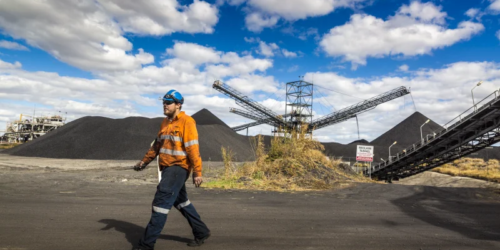Having soared to an all time high as recently as one week ago, Chinese coal futures have lost nearly half of their value in the past seven days in a sequence of limit down days as Beijing unleashed its latest crackdown on a commodity it felt was mispriced despite urging energy firms to “secure supplies at any price” less than a month ago.

There is, of course a perfectly simple, non-market driven reason for the plunge in prices: China ruthless authoritarians revealed a plan to impose limits on the price miners sell thermal coal for as they seek to ease a power crunch that’s prompted electricity rationing and even caused a blackout in a major city last month.
The plan, which is reportedly scheduled to last until May 1 of next year, is pending approval by the State Council, China’s cabinet, and could be revised, according to the people. NDRC also wants downstream sales prices to be controlled, though it will let local governments set standards to limit the price of local coal trading, the people said. Coal importers will obtain subsidies to balance their losses, they said.
The NDRC, the cabinet ministry that’s in charge of energy prices, said in a statement late Wednesday that it held a meeting with the coal industry to study concrete measures to intervene in the coal market.
The artificial 440 yuan price target will apply to term supplies from coal mines to key users like power plants in order to ease generators’ cash flow tightness and help boost electricity output, said Jia Zheng, a trader with Shanghai Dongwu Jiuying Investment Management Co. The guidelines for supplies to other users, which are decided by local governments, might be set at higher levels, she said.
“The bilateral pricing policies could ensure the coal supplies and prices for power plants and still provide incentives to coal mining production at the same time,” Jia said. The price cap means that coal will be delivered to power plants at an acceptable level of 800 yuan a ton, she said.
What she didn’t say is just where will all the coal come from. After all, the reason why a market has a thing called price is to find a clearing level of supply and demand. Any time the government imposes artificial subsidies, such as this one, the price does not reflect the surging demand, and instead the supply collapses. In this case, with a price that is far below the clearing price, we expect Chinese thermal coal supplies will crater so much faster, leaving the nation in an even greater lurch, one where no amount of central planning from Beijing will have any impact.
The energy crisis that’s engulfed the world’s second-largest economy started in part due to skyrocketing coal prices, which caused almost all coal-fired power plants in the country to run at losses. Zhengzhou’s benchmark coal futures rose to a record above 1,980 yuan a ton earlier this month, while spot prices soared even higher.
And since this is China, where the government intervenes in every market, the surges in the both futures and physical coal markets triggered immediate intervention by the country’s central government. Action by authorities to curb those gains, and to help miners boost supply, have had an impact, with futures tumbling by about a third in the past week.
Alas, as noted above, this price collapse will mean even higher prices eventually.
Some companies have already started curbing prices after top Chinese government leaders urged the industry to improve the pricing mechanism for coal and power. Jinneng Holding Coal Group, a Shanxi-based producer, said earlier Wednesday that it would cap the price of 5,500-NAR grade coal at 1,200 yuan per ton. That followed price cuts of about 100-360 yuan per ton by other miners in major coal production hubs last week.
The 440 yuan level was based on a 300 yuan estimate of the physical costs of mining the coal and transporting it to the surface, while labor and other costs account for more than 100 yuan, according to one of the people. That would cover the cost of operations in most mines in the country. All of the above, of course, assumes unlimited and readily available sources of coal.
Following the report, coal miners such as China Shenhua Energy and Yanzhou Coal Mining tumbled in trading in Hong Kong on Wednesday. At the same time, prices of aluminum, which are often recently being traded as a proxy of China’s current power crisis, fell sharply in London.







